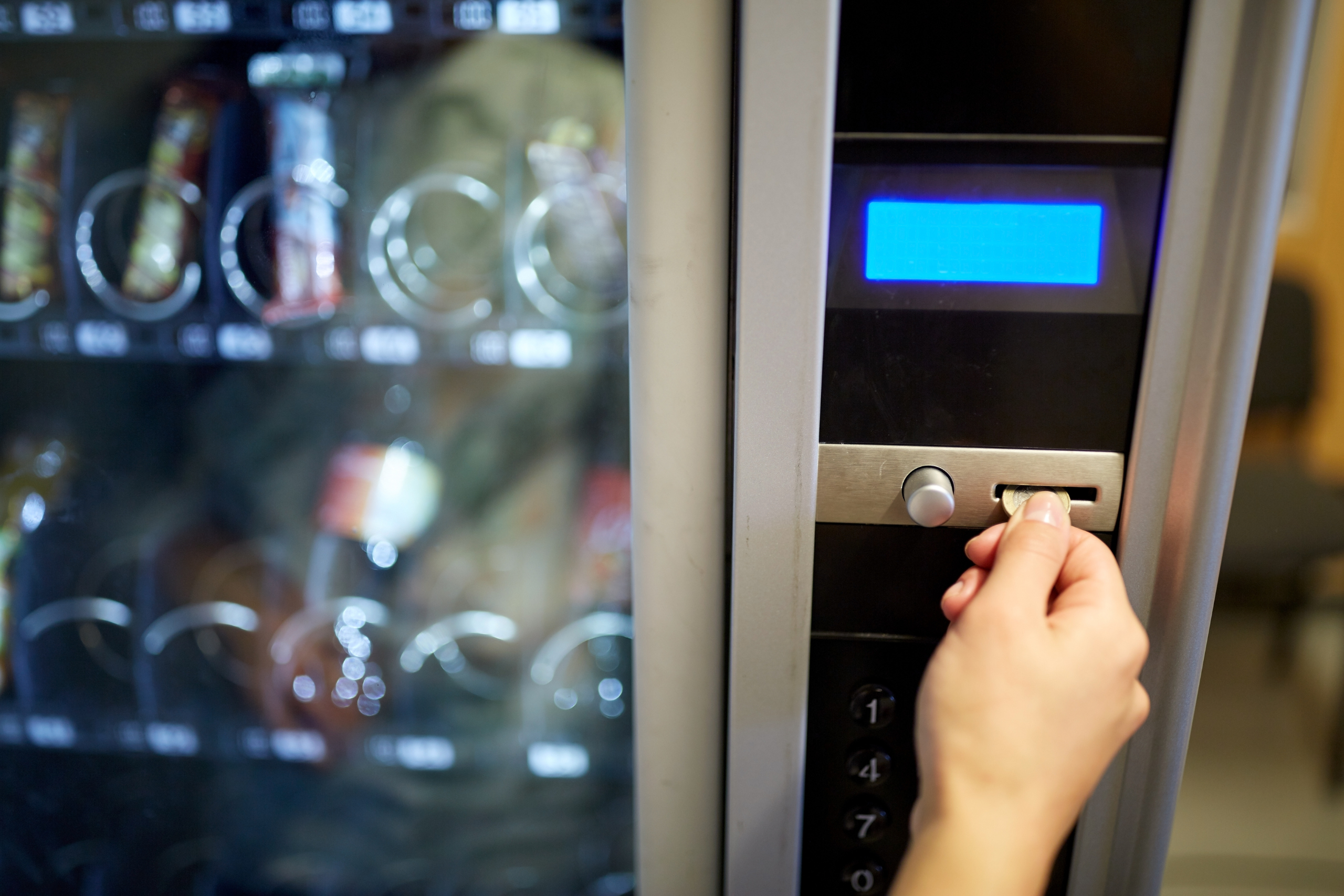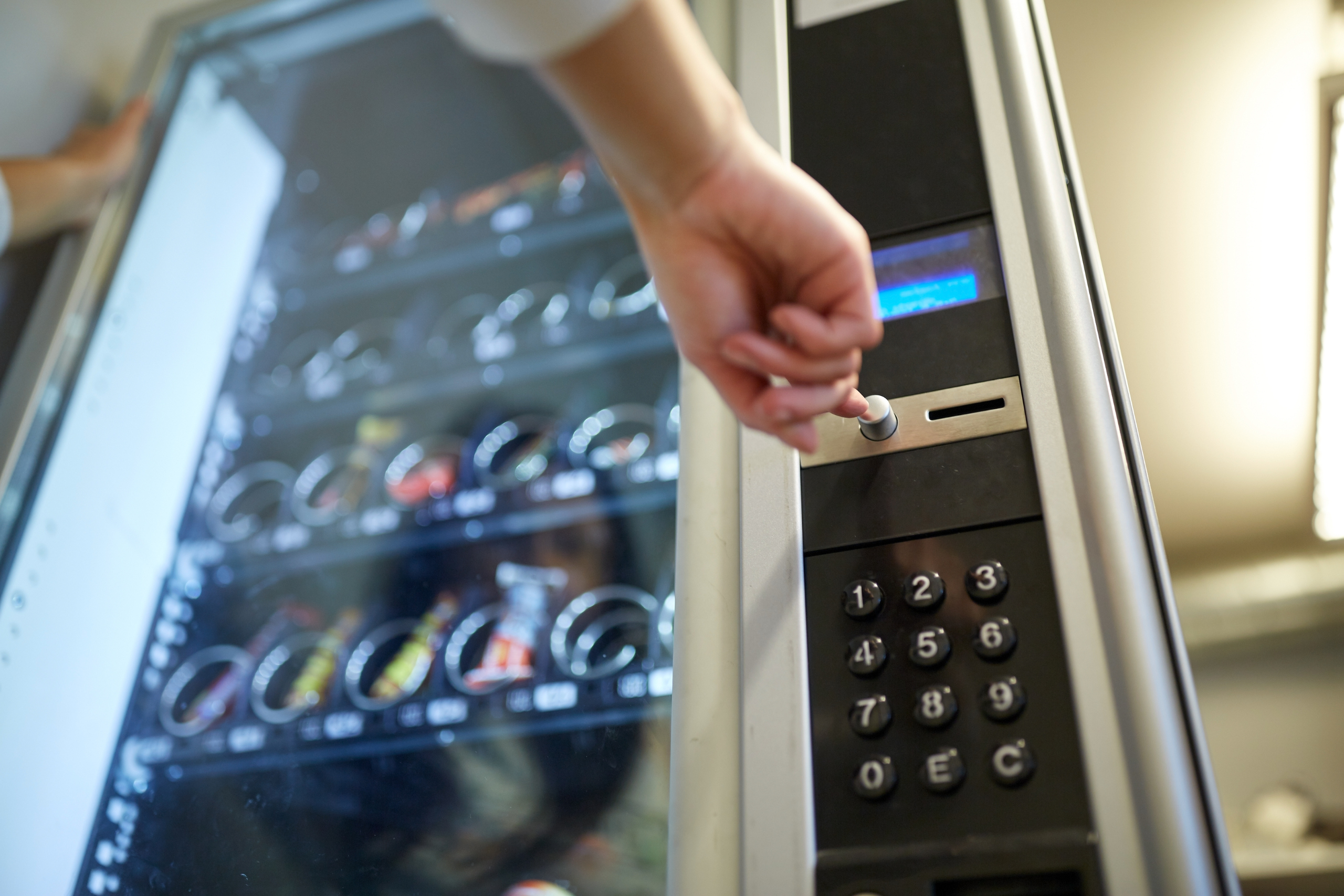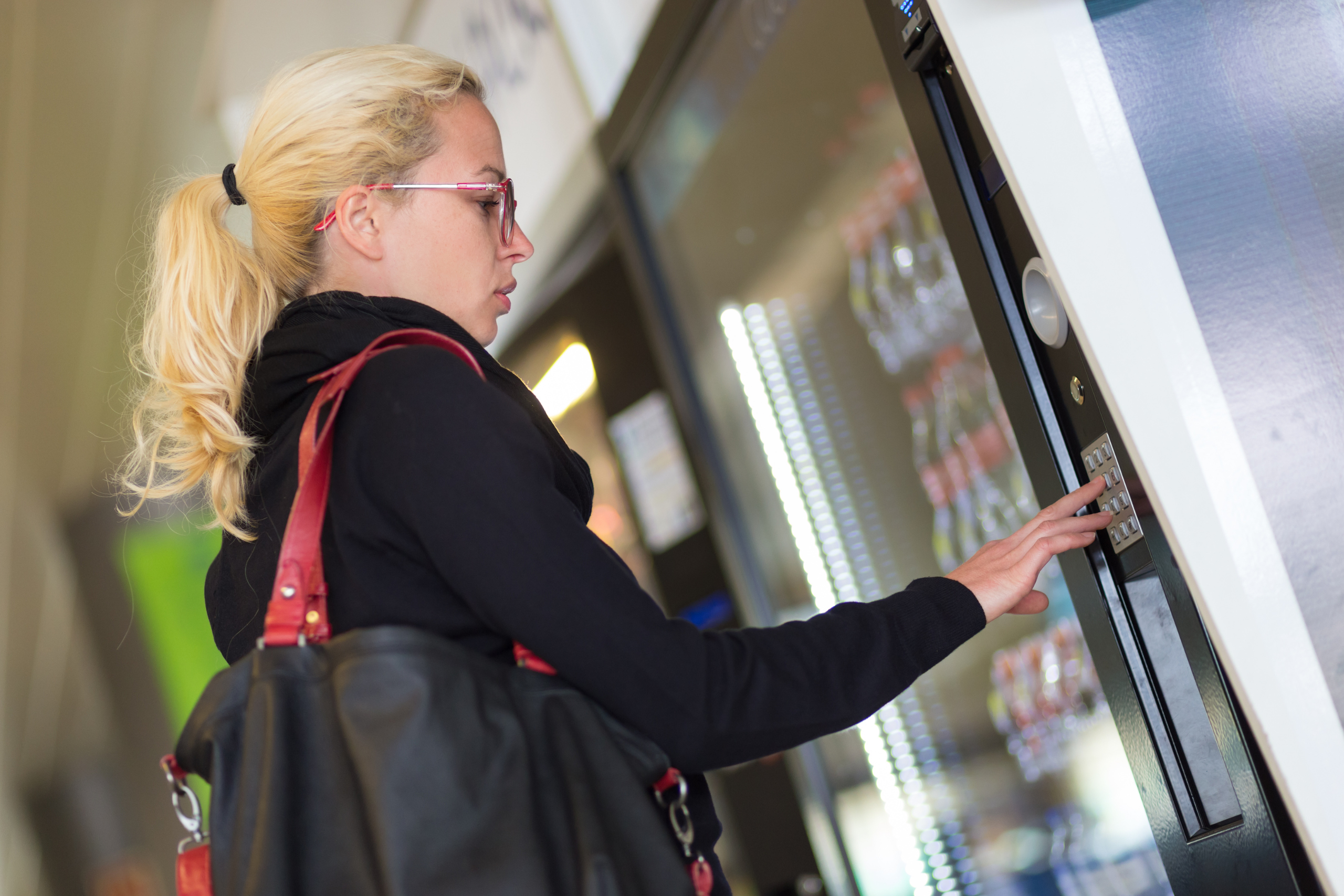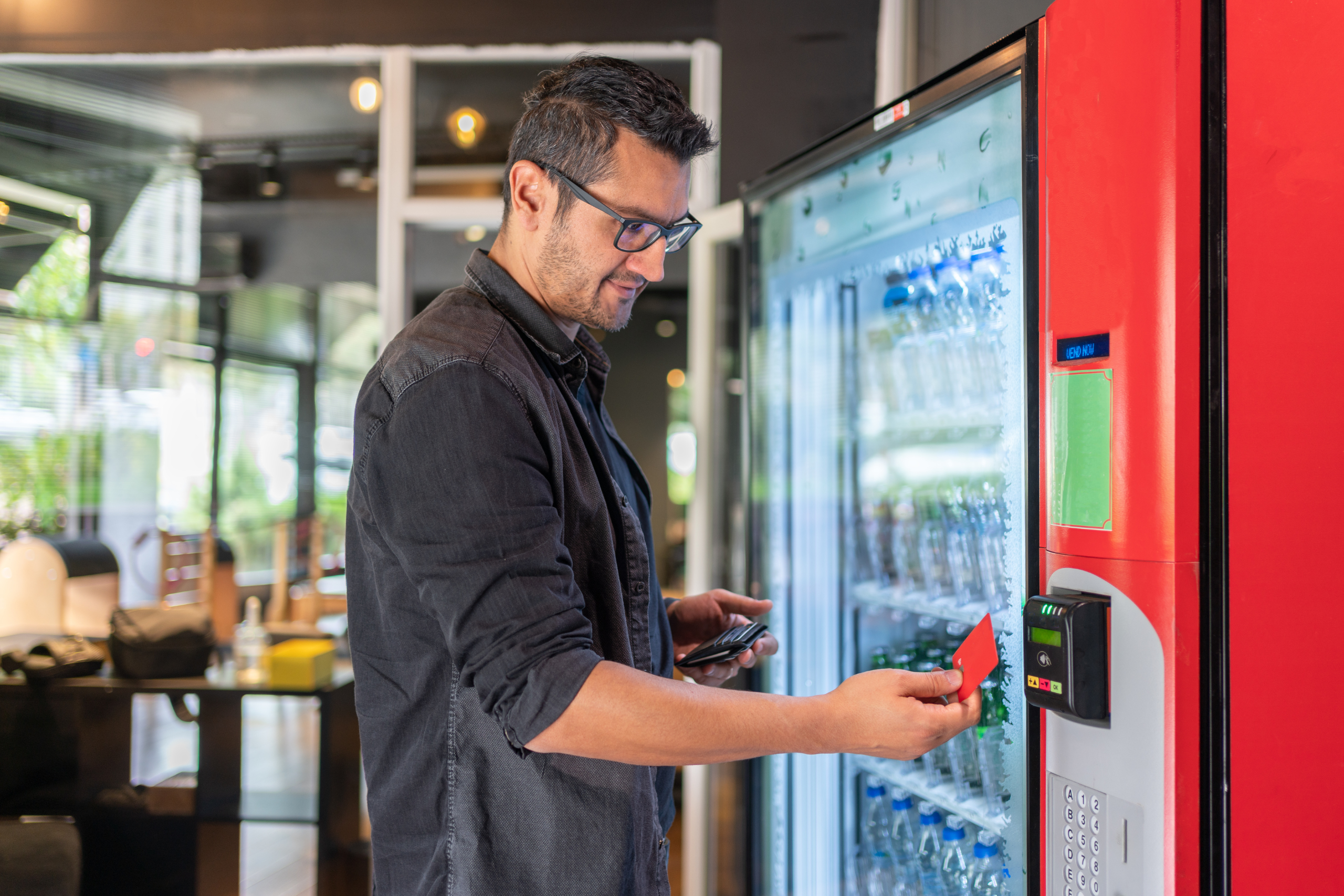Ever thought about how cool it is to pick a snack from a vending machine? If that’s something you enjoy, starting a vending machine business might be a great idea for you. Nowadays, vending machines aren’t just about chips and soda. They can offer everything from healthy snacks to electronics and even pharmacy items. This business can be a profitable side hustle or even a full-time job. Here’s the lowdown on getting started.
Table of Contents
Why Start a Vending Machine Business?
Running a vending machine business can be easy and profitable, whether with just a few machines or hundreds. The main costs are buying the machines and filling them up. You don’t need a big office for them. Your job is to keep them working well, restock them, and collect the cash.

Profitability of a Vending Machine Business
The profitability of a vending machine business can be quite promising, with the global vending machine market expected to show significant growth. As of 2024, the market size of the vending machine industry was valued at approximately $7.71 billion and is projected to expand at a Compound Annual Growth Rate (CAGR) of 16.35% in the following years. This growth is indicative of the potential profitability in the industry.
Further, the smart vending machine market alone is projected to reach $11.14 billion by 2027, trending towards more technologically advanced vending solutions. The overall global vending machine market is also forecasted to reach $25.25 billion by 2027, up from $18.28 billion in 2019.
These statistics suggest a growing demand for vending machines, which can translate into profitable opportunities for business owners. However, the profitability of individual vending machine businesses can vary greatly depending on various factors, such as location, the types of products sold, operational efficiency, and initial investment costs.
Cost of Starting a Vending Machine
Starting a vending machine business can be appealing due to its scalability and potential for passive income. However, the startup costs can vary significantly based on factors like the type of machines, number of machines, location, and initial stock. Here’s a breakdown of expenses:
Low-End Estimate:
- Vending Machine Purchase: Used or smaller machines can cost as low as $1,200 to $3,000 each.
- Inventory Stock: Initial inventory may cost around $500.
- Insurance and Licenses: Approximately $300.
- Miscellaneous (including transport, installation, etc.): $200.
- Total Low-End Estimate: About $2,000 to $4,000.
High-End Estimate:
- Vending Machine Purchase: New, high-end machines can range from $3,000 to $10,000 each.
- Inventory Stock: Premium products or larger inventory can cost upwards of $1,000.
- Insurance and Licenses: Higher coverage or multiple licenses may cost around $500 or more.
- Administrative and Operational Costs, Such as machine maintenance, software for tracking sales, etc., can add up to $1,000.
- Total High-End Estimate: Approximately $5,500 to $12,000.
These estimates give a general idea of the financial commitment required to start a vending machine business. Costs can fluctuate based on location, type of products sold, and the scale at which you start the business.
How to Start Your Vending Machine Business
Getting Ready: Pick Your Business Setup
The first step is getting some vending machines. You’ll need to form an LLC or a corporation to grow your business and handle money legally (like paying taxes and claiming business expenses).
Also, check if you need a license for a vending machine business in your area. The requirement for a vending machine license varies by state and sometimes by local jurisdiction within each state.
Most states and local governments have specific regulations in place for vending machine operators. These may include a vendor’s license, a local food service license, a resale license/permit, and a general business license. Vending machine operators need to check with their city or county government and state authorities to understand the specific licensing requirements in their area.
For example, in California, vending machine operators must have a seller’s permit whether they own one or multiple vending machines. In Virginia, vending machine business owners need a Certificate of Registration for each county and city where machines are placed.
Once you know about the license, you can get all your paperwork sorted and start smoothly.

Decide if Joining a Franchise is For You
Joining a vending machine franchise can offer several advantages for entrepreneurs looking to start a business in this sector:
- Brand Recognition: Being part of a franchise means benefiting from an established brand and customer trust, which can significantly attract customers.
- Support and Training: Franchises often provide comprehensive support and training, which can be invaluable for first-time business owners. This support can include operational guidance, marketing strategies, and technical assistance.
- Low Capital Investment: Starting a vending machine franchise typically requires a lower capital investment than other business models, making it a more accessible option for many entrepreneurs.
- Flexibility: Vending machine businesses offer flexibility in terms of location and hours of operation. As a franchisee, you can choose where to place and manage your machines on your schedule.
- Market Growth Potential: Vending machine franchises operate in a market with good prospects for growth. This industry offers potential for scalability and expanding your business footprint.
Overall, joining a vending machine franchise can provide a structured pathway to owning and operating a business with the backing of an established brand and support system.
Here are some notable vending machine franchise opportunities:
- Pharmabox: Offers automated retail stores providing over-the-counter medications and other health-related products.
- Fresh Healthy Vending: Specializes in offering healthy vending options, including snacks and beverages.
- Healthier4U Vending: Their vending machines focus on providing healthier snacking and drink options.
- HealthyYOU Vending: Offers a range of healthy snacks and drinks, emphasizing nutritional options.
- IceBorn: A franchise specializing in water and ice vending machines.
- Naturals2Go: Provides healthy snacks and drinks vending machines, catering to the growing demand for healthier options.
These franchises represent a diverse range of vending machine business models, from health-focused offerings to convenient solutions for essential products.
Think About What You Want to Sell
Food vending machines are common and easy to start with. If you go for food machines, think about what kind of snacks you want to offer. The most popular and in-demand products for vending machines typically include a variety of snacks and drinks that cater to different preferences. Here’s a list of some of the top items:
- Chips and Pretzels: Popular brands like Lay’s, Pringles, Ruffles, and Cheetos are favorites among consumers.
- Candy and Gum: Items like Skittles, M&Ms, Starburst, and Juicy Fruit Gum are in high demand.
- Chocolate Bars: Snickers Bar, Reese’s Peanut Butter Cups, and Twix are popular choices.
- Healthy Snacks: Clif Bars, Granola Bars, and Sun Chips offer healthier alternatives.
- Nuts and Trail Mixes: Items like Planters Peanuts and Planters Trail Mix are also in demand.
- Bulk Candy: Peanut M&M’s, Mike & Ikes, Skittles, Gumballs, Hot Tomales, and Plain M&M’s are top choices in bulk candy vending machines.
These items are generally well-received due to their brand recognition, taste, and convenience, making them ideal for vending machine stocking.
But there are other types, like ones that sell items in bulk or special products. Non-food products sold in vending machines encompass various items catering to convenience and emergency needs. These include:
- Basic Sundries: Items like toothbrushes, toiletries, and non-prescription medications. These are commonly found in airports, hotels, and public facilities vending machines.
- Personal Care Products: Such as hand sanitizers, face masks, and feminine hygiene products.
- Electronics and Accessories: Charging cables, headphones, power banks, and even small electronic devices.
- Office Supplies: Pens, notepads, USB drives, and other stationery items.
- Travel Essentials: Travel-sized toiletries, sewing kits, and sleep masks are often found in airport or hotel vending machines.
The range of non-food products in vending machines can vary greatly depending on the location and the specific needs of the consumers in that area.
It is important to consider the location of your machine in deciding what products to sell in your vending machine. For example, healthy snacks are a great idea for schools because schools want to give students good food options. Generally, you can choose products that fit the market you’re targeting.
Choose the Right Location for Your Vending Machines
Remember, location is everything. High foot traffic areas like malls, airports, and schools can become gold mines for your vending machines. Areas where people frequently pass by or gather are ideal for vending machines. Find what is called “captive audience locations” — e.g., places where people are likely to wait or spend time, such as conference centers or areas with limited food options.
The location depends on what your machines sell. Put your vending machine where it’ll meet the needs of your target customers. Machines with meals or microwavable food are great for places like offices, hospitals, and universities where people can’t cook. Snack machines also do well in offices. If you’re into novelty items or small candies, try specialty businesses. Machines with medicine or electronics are perfect for airports, and travel stops – these are often profitable spots.
Start by looking for spots in local businesses and plan your route. Initially, you might want them close by for easy restocking and maintenance. You can expand to more areas as you grow and hire more people.
In addition to location, ensure the vending machine is easily visible and accessible. This increases the likelihood of impulse purchases.
The cost of placing a vending machine at a location varies and is often subject to negotiation between the vending machine operator and the location owner. There are several factors to consider:
- Location Rent or Commission: Some locations may charge a flat monthly rent, while others might prefer a commission-based model, where they receive a percentage of the sales.
- Type of Location: High-traffic areas like malls or busy office buildings may command higher fees due to the potential for more sales.
- Market Rates: The going rates in your area for vending machine placements can vary—research local rates to get an idea of what’s reasonable.
- Negotiation: Be prepared to negotiate the terms. Consider the potential sales volume the location could generate and how much of your profit you’re willing to share or spend on rent.
How to Approach a Business or Facility to Place Your Vending Machine
To place machines in businesses, start networking with local business owners. If you aim for a contract with a school district or a company with multiple locations, contact someone in charge, like a regional manager, who handles big location decisions.
Begin by introducing yourself as the owner of a vending machine business. Understand the needs and characteristics of the business or facility so you can tailor your approach to their specific context and make your proposal more appealing.
Make a compelling case about how your vending machine can benefit their establishment. Highlight the advantages for the business, such as providing convenience to their employees or customers and potentially earning a commission from sales.
Be professional and prepared when meeting with your potential partners. Dress appropriately and have a well-organized presentation or proposal ready to address any questions or concerns the business owner might have.

Pick the Right Vending Machine
There are three main types of vending machines: bulk, mechanical, and electronic. Bulk machines, which you often see in restrooms selling sanitary products, are simple and dispense a single product for a small amount, like a quarter or a dollar. These are the cheapest, costing around $50 to $200.
Mechanical machines are your typical breakroom vending machines, offering various products. They cost about $2,000 to start but make more money than bulk machines.
The most advanced are electronic vending machines. They start at $3,000, usually have touch screens, and take credit card payments. They’re more expensive if they offer more food and drink options. They’re also popular because they accept cards, which is handy as fewer people carry cash these days. Just watch out for high fees on your payment system.
Stocking Up
In some places, food vending machines need to have a certain amount of healthy options. Make sure you have access to healthy snacks if required. Also, build relationships with wholesale suppliers to keep your costs low and profits high.
Buying Vending Machines
When venturing into the vending machine business, one of the most critical steps is selecting the right one. This decision can greatly influence the success and profitability of your business. It’s not just about buying a machine but investing in a tool to serve your customers and bring in revenue.
Where to Buy Vending Machines
Some of the places where you can buy vending machines include:
- Sam’s Club: Offers a wide range of vending machines, including snack machines, beverage machines, and gumball machines.
- Vending.com: Factory direct vending machine online supplier providing snack and drink machines.
- Discount Vending Store: Sells high-quality, affordable vending machines and provides tech support and training for new or used machines.
- DMVI (DigitalMediaVending.com): Recommended for high-quality vending machines.
- eVending: Offers a variety of candy and snack vending machines available for online purchase.
- AMEquipmentSales: A vending machine supplier that provides a range of new and refurbished vending machines

Tips for Buying Vending Machines
When buying vending machines, making an informed choice can help avoid common pitfalls and ensure the success of your vending machine business. Here are factors to consider when buying vending machines:
- Understand Your Business Model: Decide on the type of vending business model that suits you. For instance, bulk vending may involve selling items like gumballs or small toys from a single machine.
- Location Considerations: Factor in where you’ll place the vending machine. High-traffic areas can influence the type and profitability of the machine.
- Maintenance Requirements: Assess the maintenance needs of the vending machines. Opt for models that are easy to maintain and service.
- Evaluate Current Routes: If purchasing an existing vending machine route, research the current locations for potential issues and understand why the owner is selling. Issues like retirement are okay, but location problems are red flags.
- Product Selection: Think about the products you plan to sell. This decision should align with your target market and location preferences.
- Understand Startup Costs: Be aware of the initial investment required to plan your finances effectively, including the cost of machines and inventory.
When buying vending machines for your business, consider using or refurbished models, as they can be significantly more affordable than new ones. Prices for used or refurbished vending machines typically range between $1,200 and $3,000, offering a cost-effective start for your vending machine business. This approach can help reduce initial investment costs while providing reliable equipment for your venture.
To start your business flexibly, buy your machines and find locations independently.
Vending Machine Maintenance and Repairs
When entering the vending machine business, it’s crucial to understand the importance of maintenance and repairs. These machines, while offering a convenient service and a source of passive income, require regular attention to stay functional and profitable.
Effective maintenance and timely repairs are key to ensuring the longevity and efficiency of your vending machines. Regular check-ups are essential to avoid lost profits from downtime, whether your machines are new or used. Regular cleaning, systematic inspections, and proactive servicing help reduce downtime and reactive repairs, thereby minimizing associated costs.
Specifically, the following are some of the maintenance and repair tasks that you can expect when you start a vending machine business:
- Regular Cleaning: Vending machines require regular cleaning to prevent dirt and dust accumulation. It is recommended to use food-grade detergent, warm water, and a soft towel for cleaning twice or thrice a week.
- Routine Servicing: General maintenance includes servicing the vending machine at least once a week. This ensures it remains clean, well-stocked, and in good working condition.
- Periodic Maintenance: Depending on usage, it’s advisable to perform more extensive maintenance approximately every three months. This might involve checking and servicing more intricate parts of the machine.
- Remote Monitoring: Some vending machines allow for remote health checks, reducing the need for high on-site maintenance but ensuring that issues are promptly addressed.
- Repairs as Needed: If a vending machine experiences a malfunction, repairs should be carried out by a qualified technician. Regular maintenance can help reduce the frequency and severity of these repairs.
Moreover, the use of specialized software solutions can aid in diagnosing and resolving technical issues efficiently. Understanding the nuances of vending machine maintenance and repairs can significantly impact the success of your vending business.
Vending machines can be targets for vandalism or theft, so plan for that in your business strategy.

Frequently Asked Questions
Are Vending Machines Profitable?
Yes, vending machines can be a great way to make money. If you buy your stock at good prices and place your machine where many people go, you can earn a good income with minimal time and investment.
Where are the best spots for vending machines?
The key is high foot traffic. Places like apartments, schools, offices, and airports are ideal for vending machines.
Can you put a vending machine anywhere?
You can buy a vending machine but need permission to place it. If you find a promising spot, talk to the business owner to see if you can strike a deal.
What are the types of vending machines available?
There’s a wide range of vending machines out there. The most common ones are for snacks, sodas, and hot drinks like coffee. But there are also unique ones, like vending machines for laundry supplies, gumballs, toys, video games, water, crane games, arcade games, DVD rentals, and even coin-operated car washes.


I would like to get involved in doing vending machines I’m trying to like get a cotton candy a small machine and popcorn would like one with hotdogs on one side and a popcorn popper on other and I have a very small snow cone machine I’m wanting to get small generator and go set up in different areas to sell these items with a ice chest of different pop a some bottle water even maybe some different kind of candy but I’m on ssi income and needing helping hand to get all this up and going